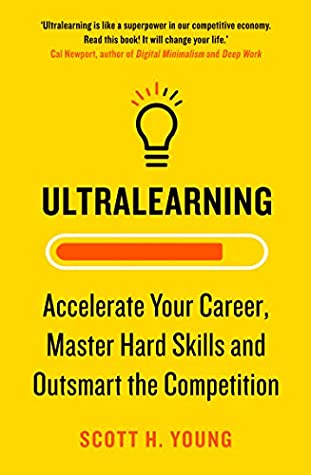‘Ultralearning’ by Scott Young is about how we can learn difficult skills effectively, particularly over short periods of time. It is an exceptional resource for anyone interested in understanding how learning works and Young offers an excellent practical introduction to the skill of ultralearning and how to use it.
Ultralearning is defined as ‘a strategy for acquiring skills and knowledge that is both self-directed and intense,’ however this is an imperfect definition by the author’s own admission. What this translates to is ultralearning as learning best suited to non-formalised situations, with reduced time scales, and requires significant personal investment. Throughout the book, Young uses a variety of stories to illustrate the importance, application, and success of ultralearning.
Young makes a point about different strategies being better suited to different problems and to different goals; ultralearning isn’t a catch-all approach to learning. In some cases, spreading the learning over a longer period in smaller doses or using a formal education system may be the ideal way to learn the topic you’re trying to. Despite which strategy you use, the nine principles outlined by Young can be applied to learning of any sort. As he states, these principles are considerations for how to approach an ultralearning project rather than being prescribed rules to blindly follow. As each principle is addressed, Young includes practical ‘tactics’ and suggestions for how to incorporate each principle into your ultralearning strategies and projects.
Although ultralearning itself calls for applying these principles in an intense and self-directed manner, the principles themselves can be used as part of any learning strategy, be it ultralearning, formal education, or otherwise. I have applied the ultralearning methodology to not only my own projects, such as app development and writing, but also to my university studies. With COVID-19 moving many courses to remote learning, I have had the opportunity to apply the principles of ultralearning to great effect. Although I may have come up with a similar solution without having read ‘Ultralearning’, I have found that having an understanding of different techniques and why they work to be invaluable in creating plans to learn. It also helps to have the book on my desk to reference, to ensure I’m applying the principles in the best way possible.
Principle #1: Meta-Learning. Learning how we, as individuals, learn best and how to learn a specific subject best.
Principle #2: Focus. The ability to concentrate resources on tasks, and avoid distraction.
Principle #3: Directness. This is learning by doing. The more precisely one can practice a skill, the quicker that skill will be learned.
Principle #4: Drill. This refers to targeted practice to improve weaknesses. Far from being mindless repetition, drills should be designed to isolate the weak area and produce improvement.
Principle #5: Retrieval. The practice of attempting to recall something. Utilised in conjunction with the correct answers and when depth and breadth are balanced.
Principle #6: Feedback. Indicators for how we can improve.
Principle 7: Retention. Remembering what you learn in the long-term.
Principle 8: Intuition. The broad understanding of a subject that allows one to quickly approximate answers.
Principle 9: Experimentation. Exploring outside what you have done to develop broader and deeper mastery of the skill being learnt.
Calling these nine principles the principles of ultralearning is something of a misnomer as they can be crucial principles to any learning.
The book provides numerous examples for each principle and their suggested tactics. As the world gets increasingly complicated and the rate of change increases, the ability to learn new skills quickly will become essential to personal and professional success.
Chris Wooding is a trainee officer in the Australian Army studying at the Australian Defence Force Academy. He has a strong interest in military history, strategy and how to think better. You can follow him on Twitter @cr_wood1.

